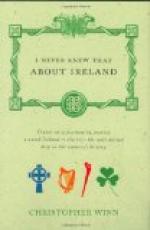It ought to be that peasant proprietorship will make the holder more industrious and a better farmer than he has been as tenant. Whether it will or not remains to be seen. As things are—always excepting Ulster and the North generally—farming could scarcely be more shameful in its neglect than it is—domestic life could scarcely be more squalid, more savage, more filthy. Even rich farmers live like pigs and with their pigs, and the stone house is no better kept than the mud cabin—the forty-acre field no better tilled than the miserable little potato patch. Had the farming been better, there would never have been the poverty, the discontent, the agitation by which Ireland had been tortured and convulsed. Had the men been more industrious, the women cleaner and more deft, the Plan of Campaign would have failed for want of social nutriment, where now it has been so disastrously triumphant. Physical well-being is a great incentive to quiet living—productive industry checks political unrest. Those who have something to lose are careful to keep it; and we may be sure that Captain Moonlight would not risk his skin if he had a good coat to cover it.
Also there is another aspect in which this land question may be viewed, and ought to be viewed—in reference to the manner in which the Irish farmer treats the property by which he lives:—that is the aspect of his duty to the community in his quality of producer for the community. We must all come down to the land as the common property of the human race. Parcelled out as it may be—by the mile or the square yard—it is the common mother of all men. We can do without everything else, from lace to marble—from statues to




